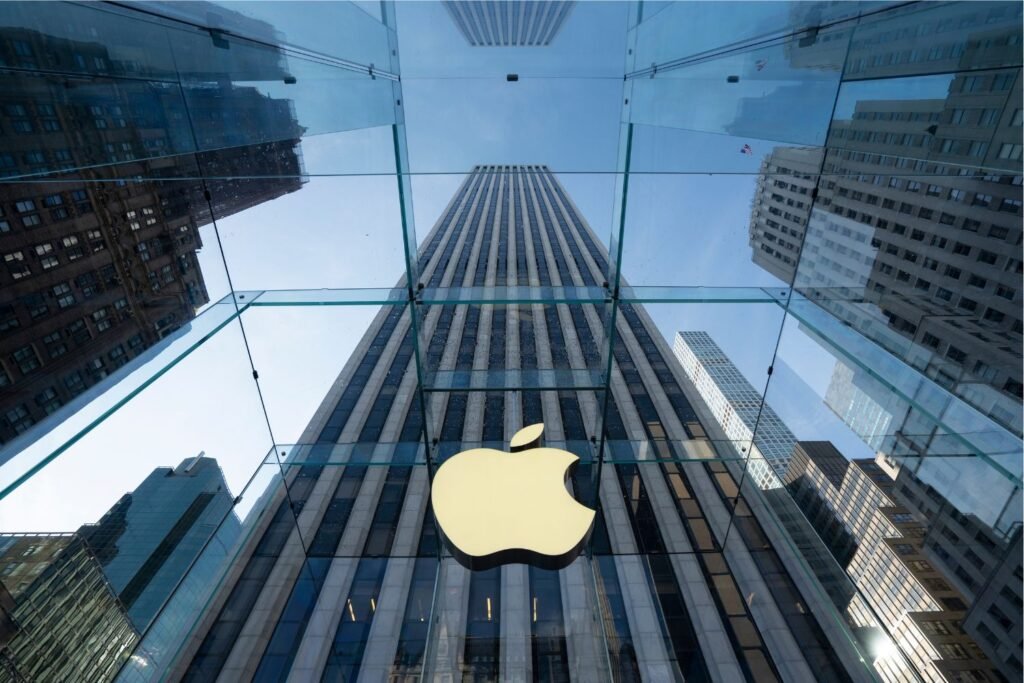Apple: The Initial Decline Following Trump’s Confirmation of a 104% Tariff Increase on China

The global economic landscape has been shaken by a decision that few saw coming with such force. The United States has taken a strong step in its trade war with China, and the repercussions have not been long in coming. From Silicon Valley to Beijing, reactions have been immediate. The stock market trembles, Apple retreats, and the whole world watches as the board of corporate power is reconfigured.
### The Spark that Ignited a Financial Storm
The White House has unleashed a new chapter in the protracted trade war with China by confirming an unprecedented tariff of 104% on imported products from the Asian giant. The announcement was met with unease by the markets, which reacted with a tumultuous day. What seemed like an aggressive measure quickly turned into the trigger for a stock market tremor with immediate effects.

This escalation is not the result of chance. Since last week, rumors of a tariff offensive had been gaining strength. It all started with a 34% tariff, presented as a “reciprocal” response to Chinese practices. However, far from appeasing the conflict, it only fueled tension. China wasted no time in responding with threats and warnings, and the United States, far from backing down, doubled down on its bet.
The result: a total tariff of 104%, which will come into effect just past midnight in Washington, has marked a new high point in this economic conflict.
### Apple Wavers and Loses Its Crown to Microsoft
The consequences of the announcement have been particularly harsh for Apple. The Cupertino-based company has experienced a nearly 5% drop in a single day, exacerbating a cumulative decline of 23% since tariff rumors intensified. This steep decline has left its market capitalization at 2.59 trillion dollars, pushing it out of the top spot among the most valuable companies on the planet.
The new leader of the podium is Microsoft, which weathered the day with a much more moderate loss of 0.92%. The Redmond-based company now boasts a market capitalization of 2.63 trillion dollars, reclaiming the throne it had lost to Apple months ago.
This rivalry between the two tech giants has become common in recent years. While Apple benefited from its solid revenue, Microsoft faced uncertainties due to its heavy investments in artificial intelligence. However, the present seems to be tipping the scales back in favor of the company founded by Bill Gates.
### The Contagion Spreads: Other Tech Companies in the Red
Apple was not the only one affected. Major tech companies have had a bad day, and the numbers reflect it. NVIDIA, third in the global market capitalization ranking, fell by 1.37%, while Amazon lost 2.62%, and Alphabet (Google) retreated by 1.78%. Even ASML, the Dutch semiconductor titan, was hit with a decline of 3.32%.
The domino effect in the sector has made it clear that the market is not prepared for a full-scale trade war. Companies most exposed to the global supply chain—especially those with strong ties to Asia—are in the crosshairs of investors, who choose caution.
This escalation from threat to reality: how the conflict with China escalated
The real trigger of this stock market storm was the lack of agreement between Washington and Beijing. Last week, the U.S. administration issued an ultimatum: if China did not back down before Tuesday, a new tariff of 50% would be imposed. China stood firm. The United States kept its promise.

By adding the existing 20% tariffs, the recently approved 34%, and this new 50% tariff, a total of 104% is reached. The measure marks the highest point of tension since Donald Trump revived commercial pressure on China, reviving old ghosts of economic protectionism.
China, for its part, has responded with strong warnings, including the possibility of restricting the distribution of American films in its territory. Everything indicates that this battle is just beginning and that the markets, for now, will remain trapped in uncertainty.
Will this be the start of a new era of global trade tension? What other consequences will this unexpected move by the White House bring? The board is at stake, and the coming days could bring new surprises.




